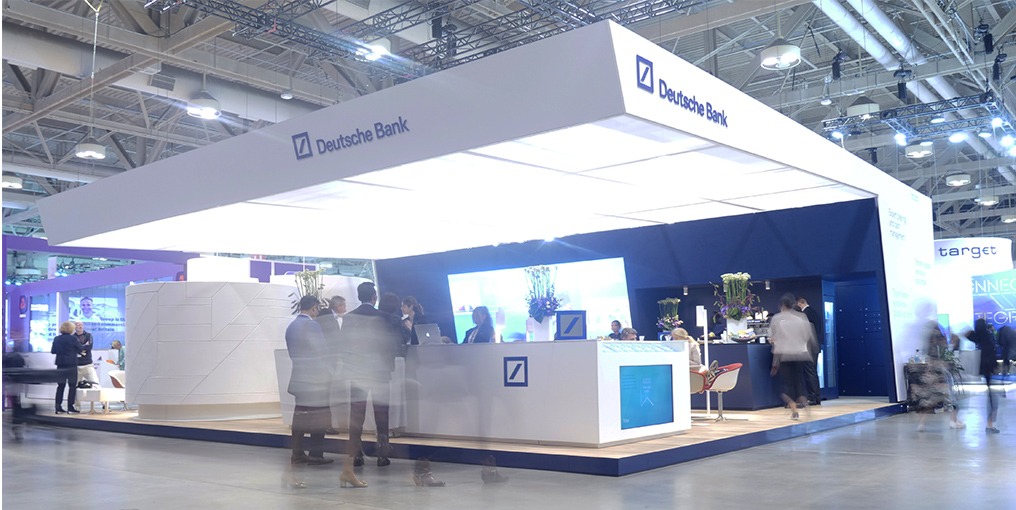04 October 2023
The Sibos 2023 agenda focused on ensuring frictionless cross-border payments using cloud and AI technology, underpinned by robust partnerships and collaboration. flow shares insights from the opening plenary session and an interview with Corporate Bank Global Head David Lynne on Sibos TV
MINUTES min read
Returning to Toronto, Canada after six years, 9,000 members of the Sibos community came together at the Metro Toronto Conference Centre to address the strengths of “collaborative finance in a fragmented world” over a packed four days of client meetings and more than 250 conference sessions.

Sibos TV anchor Ginella Massa
“This fragmentation is already having a knock-on effect on our industry,” stated Swift CEO Javier Pérez Tasso in the opening plenary session on 18 September, presented by former Canadian Broadcasting Corporation’s and City D-T news anchor Ginella Massa.
Pérez Tasso confirmed that Swift conversations with stakeholders – customers, regulators and policymakers – are being driven by “geopolitical and economic shifts” as well as “the technological innovation we see around us”. He explained how all of this, together with new forms of value such as central bank digital currencies (CBDCs) impact the way everyone operates – bringing both huge opportunity but also complexity.
Three years ago, in his 2020 leader flow interview, the Swift CEO had emphasised that Swift’s role is “to take care of everything our customers need to run their back office infrastructure smoothly and efficiently, so their own efforts can focus on innovating and growing market share across their own business lines”. Initiatives such as Swift GPI,1 Swift Go, in payments and the Unique Transaction Identifier (UTI)2 in securities services are prime examples of how Swift does this.
What we saw in Toronto 2023 – when 89% of all Swift payments now reach the recipient bank within 90 minutes – and half of these hitting the end beneficiary accounts in five minutes – was how key business areas such as cash management, trade finance and securities services were doing just that – innovating and growing value.
Grounded in payments
Sibos 2023 – the opening plenary session with Brian Moynihan, Chair of the Board and CEO of Bank of America
Brian Moynihan, Chair of the Board and CEO of Bank of America in his opening keynote talk reminded delegates that a chartered bank “exists for two reasons – you take deposits and make loans”. He went on to explain why payments are so critical and why banks should keep investing in payments technology – “it’s all about how our customers move the economy and how they express it to affect the economy. You have to invest in payments technology – this is the reason we [the banks] are here and the reason we might be missed if we were not here”.
Investment is a must “to be more secure, more informant of the customers, faster, simpler and lower costs” and Moynihan emphasised that finding solutions cannot be done in isolation – hence the need for partnerships and collaboration with organisations such as Swift. The sheer scale and volume of the payments drive the innovation journey. “People trust us to move their money, report on it accurately, get it the right place, get it with the information they want and do it over and again literally trillions of times a day,” he concluded.
Survive or thrive?
David Lynne, Head of Corporate Bank at Deutsche Bank talks to Genella Massa about investment in technology innovation
On Wednesday 20 September, Ginella Massa welcomed David Lynne, Head of Corporate Bank at Deutsche Bank to the Sibos TV studio to share his thoughts on the premise that “banks need to step up their tech innovation in order to survive in transaction banking”.
“All international banks have longstanding client relationships, we have balance sheet and capital to commit to people and we holistically know the clients’ needs, so ‘survive’ is too strong a term.” responded Lynne. “There are tremendous changes in technology and in technology companies that can help us do that, allowing us greater client solutions, speed, efficiency and cost capabilities”.
During the interview he set out where Deutsche Bank has put its focus:
- Re-positioning the bank’s whole core platform. In other words, this means moving onto the Cloud as part of the bank’s partnerships with Google and Nvidia.
- Partnering with fintechs and tech providers. An example of this was the deal signed on 14 September with Taurus for the provision of digital asset infrastructure and tokenisation capability.3 Others were the investment in Australian paytech DataMesh and the partnership with NICE Actimize to improve transaction monitoring capabilities in AML reporting – using cloud-based data storage delivering faster analytics “to look at transactions and make our bank and industry safer”.
The combination of the bank’s transaction banking businesses, cash management, securities services, trade finance, trust and agency services and its German BizBanking arm, continued Lynne, means that millions of transactions “flow through our pipes” daily. By moving to the cloud, the bank does not have to over-provide for growth and can work on a pay-per-use basis.
“Our ability to plug our applications onto the cloud is very important and the Google partnership allows us to co-innovate”
In the cloud
The Google partnership dates back to December 2020, but remains fundamental to Deutsche Bank’s digital transformation, reflected Lynne. In addition to the data and storage benefits, it puts the bank in the right place to optimise partnerships with fintechs – all of which run on cloud and not traditional servers. “Our ability to plug our applications onto the cloud is very important and the Google partnership allows us to co-innovate,” he said.
Ongoing projects include those around data management and predictive capability – as well as machine learning and artificial intelligence (AI). Specifically, a beta version of Google’s Enterprise AI is underway that deals with data privacy concerns. “It is important this sits within a data firewall form a corporate point of view,” said Lynne, adding that it was “still early days” for this project that maintains a certain degree of human-assisted functionality. “This allows people to be more productive.”
DLT and tokenisation
Having heard all the hype around blockchain and distributed ledger technology (DLT) when Sibos last came to Toronto in 2017, Massa was seeking an update. “This year the hype is around AI. Five years ago, it was blockchain and DLT, is it time to rein in the expectations we had back then? Are there still sufficient use cases to merit investment?” she asked.
“If we think back, the hype was a bit too much,” conceded Lynne. “The translation of the financial industry onto the blockchain has been relatively slower than we would have thought about five years ago.” While DLT is not really needed in bilateral relationships, “when you have a multiplicity of users having one single record is very powerful”. He proceeded to explain how tokenisation – digitalisation of assets into tokens – “will occur”.
“We have invested heavily in digital asset custody. One areas of the financial system we are seeing the quickest change in using those technologies is in the fixed income and currencies business (FIC) –settlement around repo and clearing. He explained, “With that requirement in our institutional cash management business creating treasury services, we will need the tokenisation of money to be on the other side of the transactional process.” But it has taken time, he added. “In trade, there is clearly an advantage in having one immutable record – look at the customs area of countries. But the world has not managed to link those networks together and a shipment of oil going from Rotterdam to Singapore could change hands ten times.”
A key advantage of tokenisation, concluded Lynne, is the atomic/instantaneous settlement that comes with it – and the ability to create smart contracts where the information is embedded in the tokenised asset.
Stepping up
One takeaway from all three leaders (Pérez Tasso, Moynihan and Lynne) that emerged from these sessions was one of a determined focus to improve efficiency, drive down costs and collaborate. Investment in technology has clearly already played a critical role in this – and will continue to do so. While certain technologies, such as blockchain, may only be adopted gradually and others fail completely to achieve traction, each makes its contribution towards the tokenisation journey. And in the process, banks can become agile with technology and adaptive to change, rather than playing catch-up.
Sibos Toronto 2023 took place at the Metro Convention Centre, Toronto, Canada 18–21 September. Additional highlights from Sibos TV can be viewed here

The Deutsche Bank stand F02 at Sibos



